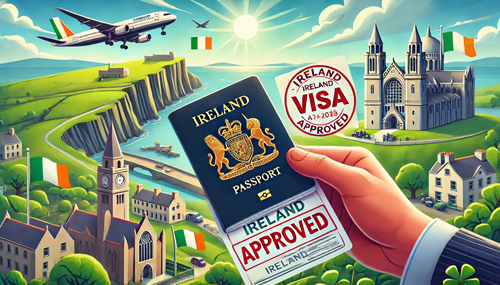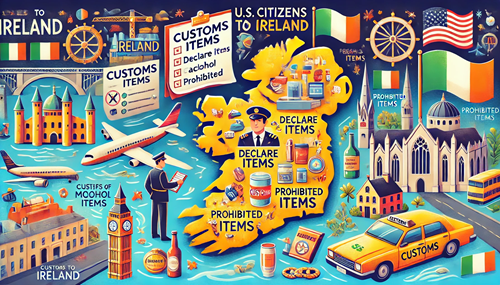Understanding the entry requirements for Ireland is essential for U.S. citizens planning to travel to ireland in 2024. This article provides a summary of necessary preparations, including visa requirements, passport validity, and COVID-19 updates. We also clarify whether vaccinations or other specific documents are required for entry.

My visit to Ireland last year was seamless thanks to careful planning. Keeping my passport updated and staying informed about travel advisories ensured a smooth trip. I hope my experience helps you prepare effectively for your journey.
Do U.S. Citizens Need a Visa to Enter Ireland?
No, U.S. citizens do not need a visa to enter Ireland. They can stay for up to 90 days without a visa. This is valid for tourism, business, or for family members' visits. However, travelers must have a valid U.S. passport.
Upon arrival, immigration officers may ask for proof of onward travel. Ensure you have sufficient funds for your stay. It's also advisable to have health insurance.
For stays longer than 90 days, a visa or residence permit is required. Always check the latest entry requirements before traveling.
What Are the Passport Requirements for the U.S. Citizens?
The passport requirements for U.S. citizens entering Ireland are carefully designed to ensure that the entry process is both smooth and compliant with international travel standards. As a primary identifier and proof of citizenship, a valid passport is indispensable for U.S. travelers when engaging with Irish immigration authorities. Understanding and adhering to these passport requirements can prevent potential entry issues and ensure a pleasant start to your visit in Ireland.
Here are the detailed passport requirements for U.S. citizens:
-
Passport Validity: Your passport must be valid for at least six months beyond your planned date of departure from Ireland. This is to ensure that if your stay becomes unexpectedly extended, your passport remains valid throughout your visit.
-
Condition of Passport: The passport must be in good condition. Passports with signs of excessive wear, damage, or alterations could be deemed invalid and may lead to denial of entry. It's crucial to ensure your passport is intact and readable.
-
Blank Pages: You must have at least one blank page available in your passport. This page is used for stamping by the Irish immigration officers upon your arrival and possibly again at departure. A lack of blank pages can result in entry being refused.
-
Photograph in Passport: The photograph in your passport should be recent, typically within the last six months, and should accurately reflect your current appearance. The photo must also meet the general passport photo guidelines regarding size, background, facial expression, and accessories.
-
Emergency Passport: If traveling on an emergency passport, ensure it is electronically readable. Emergency or temporary passports must also adhere to the same validity and condition requirements as regular passports.
What Should the U.S. Citizens Know About Customs Regulations in Ireland?

U.S. citizens should be aware of several key customs regulations when entering Ireland, including those related to the Irish visa process. When planning a trip, it's essential to familiarize yourself with Ireland's customs rules to ensure a smooth and compliant entry. These regulations are designed to protect the country’s economy, environment, and public health. It's important to adhere to these rules to avoid potential fines, visa fees, or legal issues upon arrival. Here's what you need to know:
-
Personal Allowance: Travelers from the U.S. can bring goods for personal use up to a value of €430 without paying any customs duties. This allowance helps to simplify short visits and is intended for goods intended solely for personal use or as gifts.
-
Alcohol and Tobacco: U.S. citizens are allowed to bring a reasonable amount of alcohol and tobacco products for personal use: this includes up to 16 liters of beer, 4 liters of wine, and either 1 liter of spirits or 2 liters of other alcoholic beverages (containing less than 22% alcohol by volume).
-
Food Products: Generally, bringing in meat or dairy products from non-EU countries is prohibited. However, other food items, such as confectionery, spices, and coffee, can be brought in small quantities for personal consumption.
-
Prescription Medications: Any prescription medications must be kept in their original packaging and accompanied by a prescription or doctor’s note. This is to ensure that the medications are for personal use and meet health and safety standards.
-
Cash Declarations: Any individual entering or leaving the EU with €10,000 or more in cash (or its equivalent in other currencies) must declare this amount to customs. This measure is to prevent money laundering and ensure financial transparency.
-
Prohibited Items: It is illegal to bring items such as offensive weapons, items made from endangered species, pirated goods, and counterfeit products. Ensure to check the latest regulations before traveling.
After ensuring you comply with these regulations, your entry into Ireland should be straightforward. Remember, these measures are not only for the safety and security of Ireland but also to protect travelers. Non-compliance can result in delays, fines, or even confiscation of the prohibited items. Always double-check specific allowances and restrictions close to your travel dates, as regulations can change.
For those planning a longer stay, consider the critical skills employment permit or other relevant visas provided by the Irish immigration service. If your travel involves Northern Ireland, ensure you understand the distinct regulations there. Upon arrival, an immigration officer will verify your documentation, including your Irish visa if required. Be aware of any visa fee exemptions or eligibility for the visa waiver program.
For further details, visit the local Irish embassy or the Irish department responsible for visas and immigration. They can provide information about tourist visa(s), Irish residence permit(s), and the rights of an Irish citizen. If you are granted permission to stay, ensure you follow all guidelines set forth by the visa office.
What Are Some Helpful Travel Tips for U.S. Citizens Visiting Ireland?
When considering travel tips for U.S. citizens visiting Ireland, it is important to familiarize oneself with the specific entry requirements and local customs to ensure a smooth and enjoyable trip. Ireland offers a blend of stunning landscapes, rich history, and vibrant culture, but navigating the multiple entry visa protocols and local nuances effectively can greatly enhance the travel experience. Here are some practical tips to keep in mind:
-
Passport Validity: Ensure your passport is valid for at least six months beyond your planned departure date from Ireland.
-
Travel Insurance: Obtain comprehensive travel insurance that covers medical expenses, trip cancellations, and lost luggage.
-
Customs Regulations: Familiarize yourself with Ireland's customs regulations, particularly the import of restricted items and duty-free allowances.
-
Local Laws and Etiquette: Respect local laws and cultural norms. For instance, tipping is customary in restaurants and pubs.
-
Driving: If planning to drive, remember that traffic flows on the left side of the road, and an international driver's license is recommended.
-
Weather Preparedness: Pack suitable clothing as Irish weather can be unpredictable, often changing several times in a day.
-
Currency: While Ireland uses the Euro, it's wise to have both cash and cards. Inform your bank of your travel plans to avoid any issues with your cards while abroad.
FAQs About Entry Requirements for US citizens
1. Do U.S. citizens need a visa or permission to enter to Ireland in 2024?
U.S. citizens do not need to apply for a visa, for short stays up to 90 days in Ireland. For longer stays, a visa is required.
2. What are the passport requirements for U.S. citizens traveling to Ireland?
Passports must be valid for at least six months beyond the date of entry into Ireland.
3. Are there any COVID-19 restrictions for U.S. citizens entering Ireland?
As of 2024, there are no COVID-19 re entry visa restrictions for U.S. citizens traveling to Ireland.
4. Is proof of vaccination required for visa application for U.S. citizens entering Ireland?
Proof of vaccination is not required for entry into Ireland.
5. What other documents are U.S. citizens required to present upon arrival in Ireland?
U.S. citizens should present a return ticket and proof of sufficient funds for the duration of their visa fee and stay.
